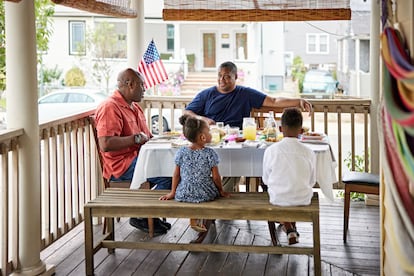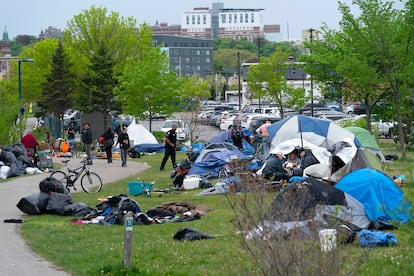$186,000 a year: What Americans feel they need to earn to live comfortably
A financial survey shows a figure that is more than double what the average worker typically makes. And 18% are certain that they will never make enough to feel financially secure

In these pre-election months, American consumers have been somewhat more cautious with their spending. Signs of a cooling economy and job market are beginning to be seen and, according to the latest poll by the investment bank Morgan Stanley, 23% of consumers expect their personal finances to deteriorate over the next six months. It is a better reading than the previous month (25% had that bad feeling). Is there any amount of income that would bring households peace of mind? Yes. The magic figure is just over $186,000 a year.
This is the conclusion reached by Bankrate’s personal finance specialists after they conducted their annual Financial Freedom Survey to understand what households feel they need, not to live in opulence, but just to feel comfortable and financially secure. This is an average amount—Latinos leave it at $173,000—that is far from the $79,000 a year that the average full-time worker earns annually, according to Census Bureau figures. To feel actually rich, the figure rises to $520,000.
Only 6% of respondents earn a figure that makes them feel financially secure. However, a good percentage remains optimistic: two out of every five people believe that at some point they will earn $186,000 a year. Meanwhile, 18% have resigned themselves to the fact that this is something they will never achieve.
In 2022, inflation reached levels not seen in 40 years and pushed up the prices of both necessary and accessory items, even though the upward pressure is now moderating. Salaries have increased, but the price of necessities such as housing have skyrocketed, and buying a home is now more difficult than ever, not only because of the high cost of mortgages, but also because of the high price of properties in a market with little supply. The GDP has emerged strong from the Covid shock, but the growth of the economy, the continuous stock market records and almost full employment have failed to lift the shadows that prices cast on the perception of the country’s progress.

This survey suggests that the feeling of not having enough income results in three out of four Americans saying that they are not completely financially secure, while 30% of them are convinced that they will never be. Last year this last percentage was lower.
One of Bankrate’s senior analysts, Mark Hamrick, points out “the messaging in America typically weighs heavily on the side of a call to action to spend, not so much to save or live beneath one’s means. A result is that all too many Americans fail to save sufficiently for emergencies and retirement.”
“There’s no question that inflation and elevated prices, as well as shifting demands for the cost burdens associated with paying for higher education, health care and retirement, have made it more challenging,” he adds.
Most of those who feel financially comfortable have completed higher education, have postgraduate degrees, and earn more than $100,000 a year. Those who see the future with more concern usually earn less than $50,000, are between 60 and 78 years old (the baby boomers), or have children over 18.
How much was the figure in past decades?
Inflation, no matter how small, alters the value of money over time. The $186K income that would reassure so many people in the United States this year was only $48,444 in 1980. In 1990, that amount was named as $76,516, and in 2010, when the effects of the financial crisis were still noticeable, it was $129,211.
Sign up for our weekly newsletter to get more English-language news coverage from EL PAÍS USA Edition
Tu suscripción se está usando en otro dispositivo
¿Quieres añadir otro usuario a tu suscripción?
Si continúas leyendo en este dispositivo, no se podrá leer en el otro.
FlechaTu suscripción se está usando en otro dispositivo y solo puedes acceder a EL PAÍS desde un dispositivo a la vez.
Si quieres compartir tu cuenta, cambia tu suscripción a la modalidad Premium, así podrás añadir otro usuario. Cada uno accederá con su propia cuenta de email, lo que os permitirá personalizar vuestra experiencia en EL PAÍS.
¿Tienes una suscripción de empresa? Accede aquí para contratar más cuentas.
En el caso de no saber quién está usando tu cuenta, te recomendamos cambiar tu contraseña aquí.
Si decides continuar compartiendo tu cuenta, este mensaje se mostrará en tu dispositivo y en el de la otra persona que está usando tu cuenta de forma indefinida, afectando a tu experiencia de lectura. Puedes consultar aquí los términos y condiciones de la suscripción digital.









































